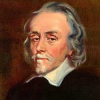William Harvey

William Harvey
William Harveywas an English physician who made seminal contributions in anatomy and physiology. He was the first known to describe completely and in detail the systemic circulation and properties of blood being pumped to the brain and body by the heart, though earlier writers, such as Realdo Colombo, Miguel Servetin: Christianismi Restitutio, Paris, 1546, and Jacques Dubois, had provided precursors of the theory. In 1973 the William Harvey Hospital was constructed in the town of Ashford, several miles from his...
NationalityEnglish
ProfessionScientist
Date of Birth1 April 1578
There is a lust in man no charm can tame: Of loudly publishing his neighbor's shame: On eagles wings immortal scandals fly, while virtuous actions are born and die.
As art is a habit with reference to things to be done, so is science a habit in respect to things to be known.
This organ deserves to be styled the starting point of life and the sun of our microcosm just as much as the sun deserves to be styled the heart of the world. For it is by the heart's vigorous beat that the blood is moved, perfected, activated, and protected from injury and coagulation. The heart is the tutelary deity of the body, the basis of life, the source of all things, carrying out its function of nourishing, warming, and activating body as a whole. But we shall more fittingly speak of these matters when we consider the final cause of this kind of movement.
I avow myself the partisan of truth alone.
There is no perfect knowledge which can be entitled ours, that is innate; none but what has been obtained from experience, or derived in some way from our senses.
It is, however, an argument of no weight to say that natural bodies are first generated or compounded out of those things into which they are at the last broken down or dissolved.
I appeal to your own eyes as my witness and judge.
Harvey sought for truth in Truth's own book- Creation - which by God himself was writ;And wisely thought 'twas fitNot to read comments only upon it,But on th' original itself to look.Methinks in Art's great circle others standLock'd up together hand in hand:Every one leads as he is led,The same bare path they tread,A dance like that of Fairies, a fantastic round,With neither change of motion nor of ground.Had Harvey to this road confined his wit,His noble circle of the blood had been untrodden yet.
Harvey was not content merely to gather knowledge; he digested and arranged it under the guidance of the faculties which compare and reason. ... Harvey appears to have possessed, in a remarkable degree, the power of persuading and conciliating those with whom he came in contact. In the whole course of his long life we hear nothing either of personal enemies or personal enmities ... one of the great men whom God, in virtue of his eternal laws, bids to appear on earth from time to time to enlighten, and to ennoble mankind.
Memory cannot exist without endurance of the things perceived, and the thing perceived cannot remain where it has never been.
Doctrine once sown strikes deep its root, and respect for antiquity influences all men.
The heart of animals is the foundation of their life, the sovereign of everything within them, the sun of their microcosm, that upon which all growth depends, from which all power proceeds.
Nature is nowhere accustomed more openly to display her secret mysteries than in cases where she shows tracings of her workings apart from the beaten paths; nor is there any better way to advance the proper practice of medicine than to give our minds to the discovery of the usual law of nature, by careful investigation of cases of rarer forms of disease.
The animal's heart is the basis of its life, its chief member, the sun of its microcosm; on the heart all its activity depends, from the heart all its liveliness and strength arise. Equally is the king the basis of his kingdoms, the sun of his microcosm, the heart of the state; from him all power arises and all grace stems.